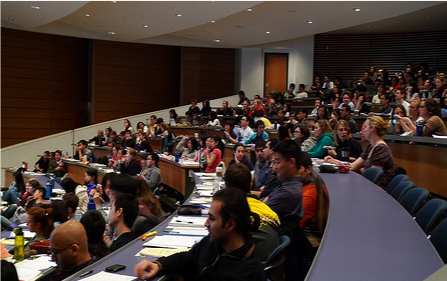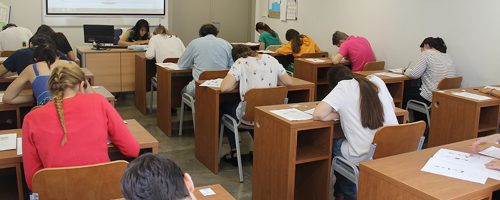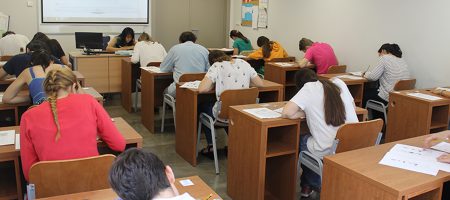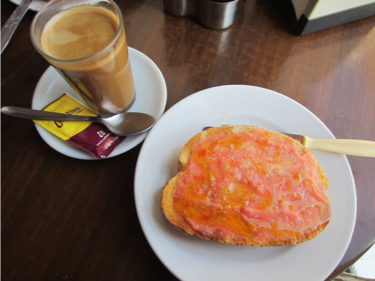Spain | Studying Abroad
BY CELIA CODY-CARRESE
Living in another country is a wonderful experience full of new friends, new experiences, and travelling to new places. It’s also challenging, and it requires you to adapt to new circumstances. Moving to a Spanish-speaking country to study the language is a lot different than taking a class at a UC. From an academic and immersive perspective, here’s what I’ve learned.
Attending university in Córdoba has been very different from my regular college life at UCLA. At UCLA I go to a large university where everything is located on one campus. The University of Córdoba has different buildings throughout Córdoba, which each serve different groups of students. I attend classes at University of Córdoba Idiomas (Languages), or UCO Idiomas. One of the biggest differences between UCLA and UCO is that classes are much smaller in Spain. My biggest class here, Spanish History, has all 27 students in my program; but my Spanish Language and Andalucían History classes both have 15 students or less. At UCLA, my smallest classes (not including discussions) have about 60 people. Having smaller classes is a nice change, and I really feel like I know my professors- they are all very kind and funny, and attentive to the needs of students.


(An average class at UCLA vs. UCO Idiomas)
Teachers here generally teach in a different style- only one of my professors uses a prepared Powerpoint for his lectures. Another professor uses maps and images sporadically, but he mainly just lectures and writes on the whiteboard. Additionally, all of my classes here are taught in Spanish! The Andalucían History class, which is an elective, was originally taught in English, but we opted to have our professor speak Spanish. It has been a good way to practice and fully immerse while at school, and he is able to get his lessons across easier by speaking in his native language. At first I was worried about having History classes in Spanish- I figured I would not be able to understand enough, and would be ill prepared for the test. However, understanding another language is one of the first steps of language acquisition (it comes easier than speaking), so within a few weeks I was understanding most of what my professors were saying!
My schedule here is also a big shift from university life. In a normal quarter I also take three classes, which are spread out throughout the week- so I might have two classes on Tuesdays and Thursdays and one on Mondays and Wednesdays. I often have days with big gaps in between classes, and my days can change a lot depending on my academic and extracurricular schedule. Here from from 9:30 to 11:30 I have Spanish class Monday through Thursday, and from 12 to 2 I have Andalucían History on Mondays and Tuesdays, and Spanish History on Wednesdays and Thursdays. Every day we have a half hour break between classes, which is much needed time to recharge with a snack! On Fridays, we go on trips to historical and cultural sites in Córdoba and around Andalucía. Having class at the same time everyday is a big adjustment- I haven’t had a schedule like that since high school! While part of me misses the flexibility of having days off or big gaps between classes, I also really like the routine of waking up at the same time everyday.
Another big difference here is the way grades and classes are structured. There is less work consistently given out, and more of your grade depends on testing. I have daily homework for my Spanish class, which usually takes me about 30 minutes to an hour, and most days I study more Spanish on my own. For the history classes I don’t have homework, and pretty much my entire grade depends on testing. My program is divided into Spring Semester students (who are in Córdoba until May) and Winter Quarter students (that’s me) who are here until March, and then returning to our schools for Spring Quarter. When we take our finals, the Semester students are also testing, but for them it is their midterms. Besides my Spanish class which also incorporates written assignments, my grades are based solely on testing and participation. It’s a little nerve-wracking, having your grade centered on one test, but I’m not too worried about the tests. One advantage of being a Quarter student in my program is that all your tests (except for Spanish, of course) are in English!
Studying abroad, especially when you are learning a new language, is a different type of learning because you are constantly absorbing new information and expanding your knowledge. You don’t just go to class, learn something, study it, and then go about your life. What you learn in class is reinforced by your life outside of university, and vice a versa. In my Spanish class we are encouraged to talk about what we did over the weekend and bring in new phrases we learned. In history we learn about Al-Andalus, the name of Andalucía when Muslims ruled and the European Caliphate was centered in Córdoba. We learn about the Catholic monarchy of Fernando and Isabel and how they expelled the Muslims from Spain. Walking through Córdoba or Granada, architectural examples of Muslim and Christian culture can be found everywhere. And most importantly, I am surrounded by Spanish all the time- in my homestay, in class, in the street. This makes understanding and practicing Spanish much more accessible, and it becomes part of your life faster than it would without immersion.
It takes years and years of practice to become fluent in another language. By living in another country for a few months, you will improve and learn a lot- but you won’t become fluent. However, by immersing yourself and making an effort to practice every day, you are bound to improve, and lay the groundwork for communicating in another language!
Celia Cody-Carrese studied abroad in Cordoba, Spain, in Winter 2017: http://eap.ucop.edu/OurPrograms/spain/Pages/exploring_andalucia.aspx




